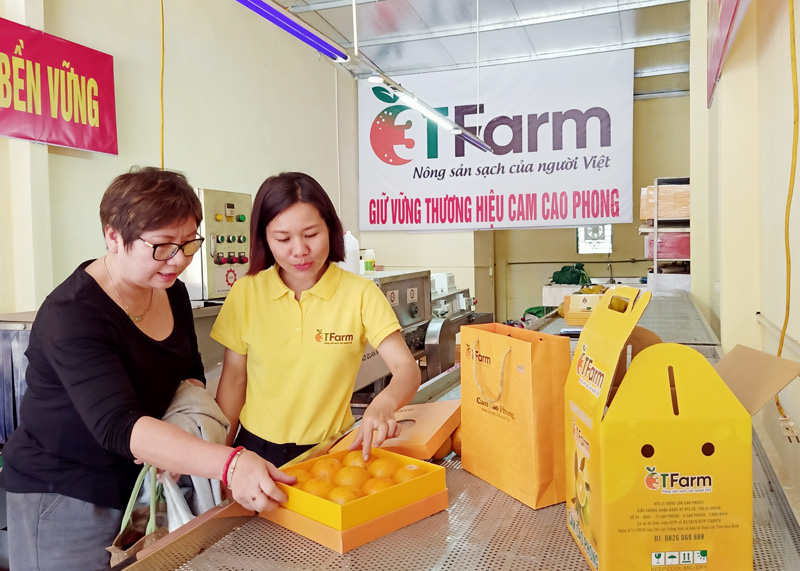
(HBO) - The product "Oranges - premium gifts” of the 3T Cao Phong agricultural cooperative has been granted a three-star rating for OCOP product at the provincial-level. The cooperative has built the "three good” criteria for its farm products - good soil, good seed, good heart – with the goal of making a real difference between its oranges and other types of oranges produced in Cao Phong district.
 Customers from Hanoi choose oranges from the 3T Cao Phong agricultural cooperative.
Customers from Hanoi choose oranges from the 3T Cao Phong agricultural cooperative.
The
cooperative groups 25 member households, who are planting orange trees on a
total area of 43.9 ha. Two-thirds
of the orange growing area of the members is cultivated strictly following regulations
on the use of organic agricultural materials. Farmers use fertilizer made from earthworm, which strengthen
the resistance of plants after harvest, and their floweringorfruiting capacity as well.
With
the goal of maintaining and further developing its Cao Phong orange brand, the
cooperative has adopted creative methods to produce clean and high-end products. It
has minimised the use of chemical materials and absolutely not used herbicide. The
harvesting and packaging process is carried out in a continuous chain from picking
fruits, washing, sorting, bio-remediation, and labeling.
The
product "Oranges - premium gifts”, which is produced in an organic
production chain, was selected to be an OCOP products in 2019. To
ensure the product’s quality, only eight percent of the total harvest are
selected as gifts. Oranges are packed in luxurious and eye-catching designed
packaging to meet the demand of customers.
This
product has received positive feedback from customers. In 2019, the cooperative
sold nearly 2,000 boxes of this kind, earning over 400 million VND. The
cooperative’s products are sold in the Vinmart supermarket system and clean
food stores.
In the coming time, the
cooperative will expand its sale scale, and strengthen management for
production. It plans to expand the planting area of organic orange to 5 ha. The cooperative intends to provide tours to orange orchards with the aim of
increasing revenue from orange farming./.
Dao Village’s honey – a product certified with a 3-star OCOP (One Commune One Product) rating by Thong Nhat Agricultural Cooperative in Dao Village (Hoa Binh City) – is highly regarded by consumers for its quality, richness, and variety in packaging. The distinctively sweet taste of Dao Village’s honey leaves a lasting impression on anyone who has tried it.
In alignment with Project No. 07-DA/TU, issued by the Hoa Binh provincial Party Committee on November 1, 2021, Lac Thuy district has actively promoted investment and supported the sustainable development of its industrial and handicraft sectors during the 2021–2025 period. Alongside this, the district has remained committed to preserving and revitalising traditional craft villages.
Located in the northern part of Lac Thuy district, with a temperate climate and fertile soil, Phu Thanh commune has great potential and advantages in growing tea. The long-standing experience, combined with strict adherence to organic farming practices in the tea gardens, ensures that the dried tea products from Phu Thanh and Lac Thuy as a whole are sold out immediately upon production, providing a stable and prosperous life for the local people.
Amid efforts to streamline the administrative apparatus, Hoa Binh province has intensified measures to address challenges in land clearance, resettlement support, and infrastructure investment, aiming to speed up the progress of key projects.
Hoa Binh province has posted an unprecedented economic growth rate of 12.76% in the first quarter of 2025, marking its highest quarterly performance to date and positioning it as the second fastest-growing locality in the country, trailing only Bac Giang province.
Under current regulations, products in the One Commune – One Product (OCOP) programme that are rated three stars or higher must undergo re-evaluation every three months. However, in reality, some of these products fail to consistently meet the required standards, raising concerns about the sustainability of their OCOP certification. This underscores the urgent need for producers to enhance product quality and gradually develop their OCOP products into strong, marketable brands.



 Customers from Hanoi choose oranges from the 3T Cao Phong agricultural cooperative.
Customers from Hanoi choose oranges from the 3T Cao Phong agricultural cooperative.